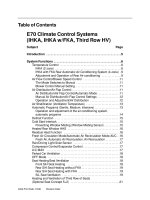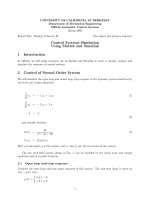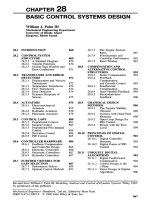toyota training course t874 engine control systems II ch01
Bạn đang xem bản rút gọn của tài liệu. Xem và tải ngay bản đầy đủ của tài liệu tại đây (3.77 MB, 8 trang )
Section 1
Diagnostic Tools and Resources
Slide 2
Diagnostic Tools and There are many troubleshooting “tools” that can be used to accurately
Resources identify and troubleshoot driveability problems. These include:
•Previous troubleshooting experience
•Vehicle OBD system
•Service Literature – Technical Information System (TIS), Repair
Manuals, Electrical Wiring Diagrams, and Technical Service
Bulletins
•Techstream
There are also other resources at your disposal for those extraordinary
situations where your best attempts fail to resolve the customer concerns:
•Technical Assistance hotline
•Area office assistance; STSs, FTSs, and FPEs
With these resources available to you, even the most difficult customer
concerns can be resolved while maintaining high standards for customer
satisfaction.
Previous Your experience is one of the best resources you have. Depending on the
Troubleshooting symptom or customer description of the driveability concern, you can
Experience often eliminate many sub-systems from your diagnostic investigations.
It is important to note, however, this does not mean that troubleshooting
is performed in a random manner. In fact, you will always fix the car
faster and with more accuracy when you follow a systematic diagnostic
approach.
Toyota Engine Control Systems I
Course 852
1
The 6-Step Diagnostic Process
Diagnostic Tools and Resources
Slide 1
T874f509, T874f310, T874f508
Slide 3
The 6-Step 1) Verify the Complaint
Diagnostic Process
•Does a problem exist?
•Intermittent or continuous?
•Customer Problem Analysis Check sheet from RM
•Clarify any and all unknowns
•Operating conditions
2) Determine the Related Symptoms
•Third-party repairs
•Body shop repairs
•Accessory installation
3) Analyze the Symptoms
•Look for related issues
•Is there more than one problem?
4) Isolate the Trouble
•Use appropriate tools
•DTC only provides general area of concern
•Process of elimination
5) Correct the Trouble
•Use correct tools
•Follow recommended procedures
6) Check for Proper Operation
•Check monitor status
2
TOYOTA Technical Training
DTC Check
Diagnostic Tools and Resources
Slide 1
T874f509, T874f310, T874f508
Slide 4
DTC Check During the DTC check, it is very important to determine whether the
problem indicated by the DTC either: 1) still occurs, or 2) occurred in the
past but has returned to normal. In addition, the DTC should be compared
to the problem symptom to see if they are related. For this reason, DTCs
should be checked before and after confirmation of symptoms (i.e.,
whether or not problem symptoms exist) to determine current system
conditions, as shown in the flowchart.
Never skip the DTC check. Failing to check DTCs may, depending on
the case, result in unnecessary troubleshooting for systems operating
normally or lead to repairs not related to the problem. Follow the
procedures listed in the flowchart in the correct order.
The flowchart shows how to proceed with troubleshooting using the
DTC check. Directions from the flowchart will indicate how to proceed
either to DTC troubleshooting or to the troubleshooting of each problem
symptom.
NOTE: Refer to the Introduction section of the Repair Manual (RM) for more
information.
Toyota Engine Control Systems I
Course 852
3
Diagnostic Information
Diagnostic Tools and Resources
Slide 5
Diagnostic Knowing where to find appropriate information saves time and helps
Information ensure accurate and timely repairs. You should be familiar with and
comfortable using the following information sources:
•Technical Information System (TIS)
•Repair Manual (RM)
•Electrical Wiring Diagram (EWD)
•Service Bulletins (SB)
•TAS support
4
TOYOTA Technical Training
DTC Information
Diagnostic Tools and Resources
Slide 6
DTC Information If the DTCs are output after the DTC check procedure is completed, use
the Repair Manual (RM) for the DTC diagnostic procedure.
There is a lot of important information in the DTC troubleshooting
sections of the Repair Manual (RM), such as the system description,
monitor description, monitor strategy, typical enabling conditions, typical
malfunction thresholds, wiring diagram, and inspection procedure.
Carefully studying this information before beginning diagnosis may help
you to better understand the issue and its cause.
•The Navigation Tree allows easy navigation between documents.
•The Description provides an overview of the system operation.
•The Monitor Description provides an overview of the monitor
operation.
•The Monitor Strategy provides information on related DTCs,
required sensors and components to operate (main and related),
frequency of operation (continuous or once per driving cycle),
duration of operation, MIL operation, and sequence of operation.
•The Typical Enabling Conditions provides information on specific
conditions necessary for the monitor to operate, such as DTCs
that cannot be present, system status, battery voltage, and other
important conditions.
Toyota Engine Control Systems I
Course 852
5
DTC Information, cont.
Diagnostic Tools and Resources
•The Typical Malfunction Thresholds provides information on what
will cause the monitor to fail and a DTC to set.
•The Component Operating Range provides component
specifications (if applicable).
•The Wiring Diagram provides a thorough wiring diagram of the
system and components.
•The Inspection Procedure provides the procedure for diagnosing the
cause of the DTC.
6
TOYOTA Technical Training
Repair Manual
Diagnostic Tools and Resources
Slide 1
T874f509, T874f310, T874f508
Slide 7
Repair Manual The Repair Manual contains the following sections (may vary by model
and year):
•Precaution lists unique service requirements specific to the vehicle.
•Definition of Terms provides descriptions of system terminology.
•System Diagram is a high-level electrical wiring diagram of the
system.
•Basic Inspection describes fundamental checks of air, fuel, and
spark.
•Readiness Monitor Drive Pattern provides charts that describe
drive patterns for specific monitors.
•Problem Symptoms Table is used to aid diagnosis when there is no
DTC displayed.
•Terminals of ECM shows the ECM and its connectors as you
would view them.
•Diagnosis System explains scan tool connection, usage, and trip
detection logic, and includes a DLC3 diagram.
•Freeze Frame Data lists descriptions of Techstream parameters
recorded during a freeze frame.
•Fail-Safe Chart indicates ECM strategy when certain DTCs are set.
•Data List / Active Test provides a comprehensive list of data list
parameters and active tests.
•Diagnostic Trouble Code Chart displays all applicable DTCs,
possible trouble areas, and links to DTC diagnosis sections.
Toyota Engine Control Systems I
Course 852
7
Terminals of ECM
Diagnostic Tools and Resources
Slide 8
Terminals of ECM
There is a Terminals of ECM document specific to each vehicle and
model year. The document includes an illustration of all ECM terminals
and their location on the ECM connector. Below the illustration is a chart
of information for each terminal:
•The Symbols (Terminal No.) column provides the names and ECM
connector locations (terminal and corresponding ground).
•The Wiring Colors column provides the wire colors (terminal and
corresponding ground).
•The Terminal Descriptions column describes terminal function.
•The Conditions column describes the appropriate testing
conditions.
•The Std Voltages/Specified Condition column provides the
standard operating range.
The bottom of the Terminals of ECM document also includes waveform
examples for various engine system sensors. These examples are a useful
reference when using an oscilloscope during diagnosis.
8
TOYOTA Technical Training









